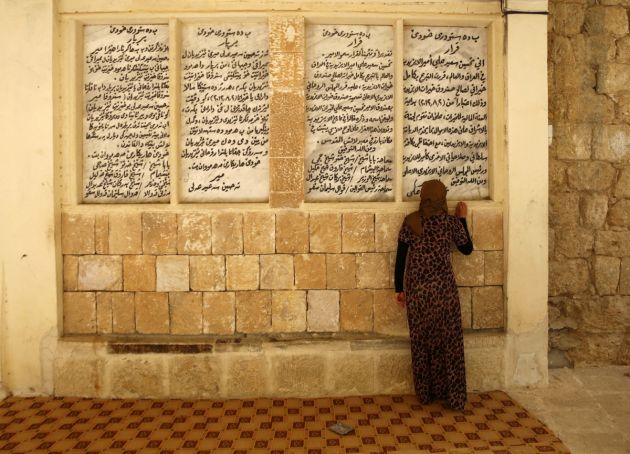Civilians must be protected in Mosul 'regardless of their religion' say civil society groups

As the push to seize back Iraq's second biggest city from Islamist extremists pressed ahead a partnership of civil society groups have issued a call from Iraqi Kurdistan that "civilians must be protected in Mosul, regardless of their religion."
U.N. High Commissioner for Human Rights Zeid Ra'ad Al Hussein on Onct. 21 called for the protection of civilians to be at the forefront of military planning as the Iraqi Government and associated forces attempt to re-take Mosul.
His statment ofllowed reports that fighters from the so-called Islamic State of Iraq and the Levant, ISIL, are using civilians as human shields.
"We are gravely worried by reports that ISIL is using civilians in and around Mosul as human shields as the Iraqi forces advance, keeping civilians close to their offices or places where fighters are located, which may result in civilian casualties," said Zeid.
"We therefore welcome the public statements by Iraq's leaders that the utmost efforts will be made to protect civilians, as required by international humanitarian law."
Oct. 18, Geneva Call had in partnership with Un Ponte Per, Public Aid Organization and Norwegian People's Aid, organized a conference in Dohuk on the protection of civilians during the military operations in Mosul.
"It is essential that civil society makes its voice heard to the armed actors and you have to disseminate the values of humanitarian norms within your community." declared E. Decrey Warner, Geneva Call's President.
"The respect of civilians is important not only during military operations but also for the future. Reconciliation and reconstruction cannot be built on atrocities."
Iraqi special forces reclaimed a strategically important town from the group that calls itself Islamic State, and is also known as Daesh, on Oct. 20 and joined Kurdish fighters in starting a new front in the assault to dislodge the group from Mosul.
IRAQI SPECIAL FORCES
The capture of Bartella, about 8 miles (13 kilometers) east of Mosul, by the U.S.-trained special forces puts militant positions in the city well within the range of government artillery, reported The Wall Street Journal.
The attacking unit known as the Golden Division, specializes in urban warfare. It took part in the offensive to retake Iraq's second-largest city for the first time Oct. 20.
The day before, Chaloka Beyani, the U.N. Special Rapporteur on the human rights of internally displaced persons, expressed deep concerns about their plight following intensified fighting and its potential humanitarian consequences as Iraqi forces were launching their military campaign to retake Mosul.
As many as 1.5 million women, men, girls and boys may be impacted by the military campaign, and 200,000 people are expected to be displaced in the first weeks, according to UN agencies.
In a worst-case scenario, one million people could be displaced and 700,000 could be in need of emergency shelter.
"While humanitarian agencies have put in place preparedness measures ahead of the offensive to ensure that protection needs are met and humanitarian assistance is ready to be distributed, arrangements for safe exit in dignity have not been given enough attention," Beyani said.
At the Dohuk conference, more than 130 representatives from civil society organizations participated in the conference said Geneva Call in a statement.
Geneva Call is Geneva Call is a neutral and impartial non-governmental organization dedicated to promoting respect by armed non-State actors for international humanitarian norms in armed conflict and other situations of violence
Conference participants included the authorities of the Ninawa province, representatives from all religious and ethnic minorities present in Mosul, Yezidi, Christian, Sunni and Shia minorities as well as local and international nonprofit organizations working in the area.
Together they adopted a joint declaration in which they called on all parties involved in the current military operations to protect civilian populations regardless of their religion or ethnicity.
The recent military operations in the Ninawa province launched by a coalition of international and Iraqi armed actors could result in a dramatic humanitarian crisis as Mosul is still home to more than 1 million Iraqis.
Recruitment of children, sexual violence, acts of revenge, summary executions as well as indiscriminate bombing are some of the violations that may affect civilians.
Many participants stressed the need for accountability, as one attendee said: "it is important to respect humanitarian norms, but also to bring perpetrators of violations to justice".
Since the beginning of 2016, Geneva Call has trained and sensitized more than 800 officers, fighters and members of armed actors and civil society organizations in Iraq on humanitarian norms, including members of the most important forces involved in the Mosul operations.
It said it recently conducted a 10-day training of trainers on humanitarian norms for 21 Peshmerga officers, completed several training sessions for officers of the Shia Popular Mobilization Units in Baghdad and sensitized Sunni and Shia tribal leaders.
It has also organized a training session for Shia fighters in Kerbala in collaboration with the Shia religious authorities.
In addition, Geneva Call is running a video campaign on the rules of war - Fighter not Killer – that has to date been viewed by more than 7 million Iraqis on Facebook and millions more on the main Arabic and Kurdish Iraqi television networks